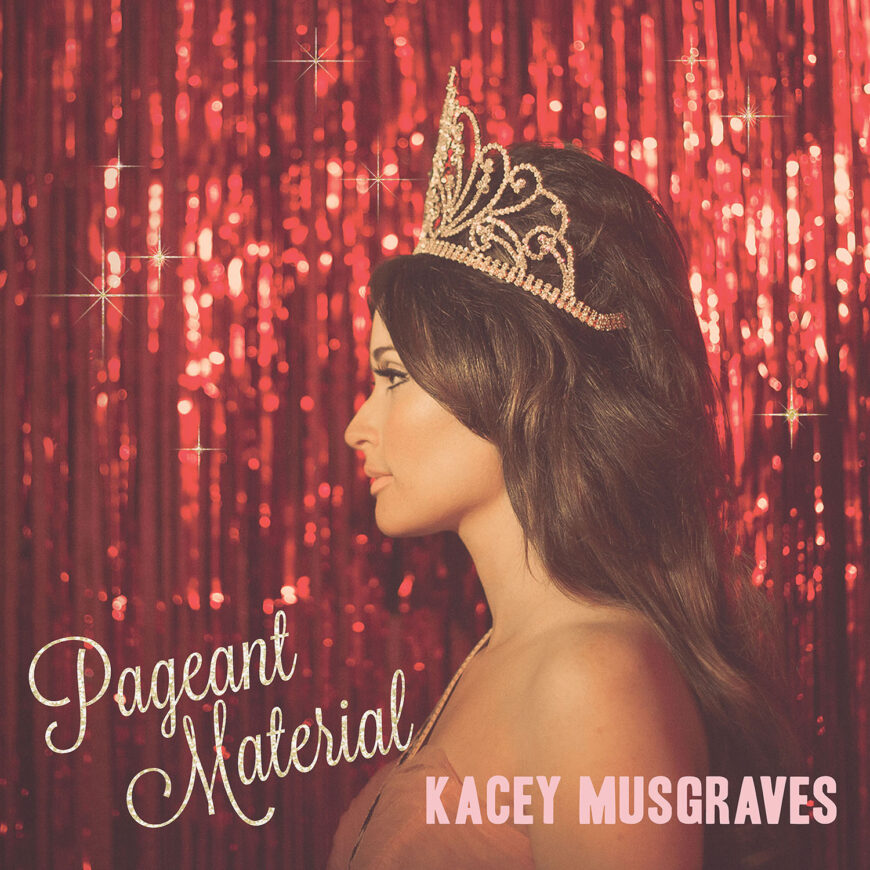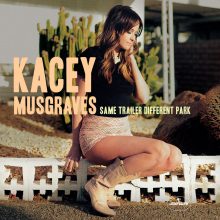Golden, Texas is kind of a misnomer. Eighty minutes outside of Dallas, its claim to fame is an entire festival dedicated to tubers, with parades and music and something called mutton bustin’. But the small town is known for neither the gilded flesh of its yukons nor its butterballs; instead, its pride and joy is the humble, orange-gutted Ipomoea batatas — the sweet potato.
Or it was the town’s pride and joy until 2014, when Golden native Kacey Musgraves’ Same Trailer Different Park became the first debut album to win the Grammy for Best Contemporary Country Album. Its plainspoken platitudes and front porch proverbs were a welcome life preserver for traditionalists left awash in the tequila-and-Baja-Blast-scented sea of bro country that saturated the charts in the early-to-mid teens. Conversely, consummate pop radio fans and hipsters alike couldn’t resist this cool, self-assured stoner girl with the agreeable lilt in her voice, the one who seemed like she routinely ransacked grandma’s old hi-fi collection for all the choice Loretta, Patsy, and Dolly.
It may seem odd now, but at the time, the kind of fiercely independent, tell-it-like-it-is female archetype that has popped up so frequently in country music’s history had largely been MIA. When Same Trailer was released, Miranda Lambert was probably-not-happily-but-still-legally married to a coach from The Voice; contemporaries like Maren Morris and Margo Price hadn’t released their respective debuts just yet. Today there are countless examples of young artists modeled on these women, but in 2013, Musgraves was a breath of fresh air that went down as smooth as a Camel Crush.
“Obviously, there is happiness in commercial success,” Musgraves told the Washington Post while doing Trailer press. “But people get attached to you and who they think you are. And if you do something that throws them for a loop, well, then you’re the bad guy.” So when it came time to record her sophomore effort Pageant Material — released 10 years ago today — Musgraves wisely took her own advice and played the hand that was naturally dealt. She rehired production team Shane McAnally and Luke Laird, recorded the thing live, and added some strings on the back end for good measure. Fussless and mussless, unbroken and unfixed, it debuted at #3 on the Billboard 200.
But Musgraves unsurprisingly proved too canny to rest on her laurels on another merry-go-round. Her ’60s role models had been lovingly swapped out for the tough-but-tender Tammys and Tanyas of the ’70s, full of high country melodies, loping guitars, and hair higher than the vistas themselves. Borrowing some attitude from her father Craig’s record collection by way of Tom Petty and channeling the evidently cherished influence of Bobbie Gentry, Musgraves took her straightforward sound and drenched it in retro technicolor.
Every song on Pageant Material is its own little treasure; some also happen to be minor miracles. This is due largely in part to what a laser-focused lyricist Musgraves is. She can cut right to the quick and — using an innate, almost alchemic charm — not only get you to take an eye-roller like “You can take me out of the country/ But you can’t take the country out of me” at face value but hold it in some sort of half-baked philosophical reverence. Still, Musgraves’ biggest strength is the fact that her writing is rooted in reality and relatability. On “Dime Store Cowgirl,” she gets her picture taken with Willie Nelson (actually happened) and drinks some wine she can’t afford (probably happened). This commitment to the KISS method pays dividends: She’s funny in person, so she’s funny on record. She’s no more or less fucked up than you are, but definitely way less fucked up than the gossipy neighbors and ain’t-shit exes that hang around in these songs. She’s constantly feeling suffocated by your depression, but she’s never late to the party when she’s late to the party with you (aw). She might not really like you all that much. She’s still got your back.
Two years after Pageant Material’s release, Chris Stapleton won the Best Contemporary Country Album Grammy for Traveler, the second debut to be awarded that specific honor. While Stapleton’s influences drew from meat-and-potatoes outlaw country, he and Musgraves were temporarily the faces of a loose new guard, neo-traditionalists with a genuine respect for their influences but preoccupied with matters of the modern heart and mind. Musgraves would go on to find love, only to (inevitably?) have her heart broken, eventually winding up lost in time somewhere in Laurel Canyon.
But before any of that, there was Golden, and wouldn’t you know it? In addition to mutton bustin’, the Golden Sweet Potato Festival also hosts a yearly pageant. “For the little girls, they have a ‘Little Miss Tater Tot.’ Since I was 3 or 4 at the time, I gave it a shot for Miss Tater Tot,” Musgraves recalled around the time of Pageant Material. “But I lost miserably. I went down in flames and I never looked back.” Said the girl who’d rather lose for what she is than win for what she ain’t. Besides, sweet potatoes aren’t even actually potatoes, anyways — they’re morning glories.








